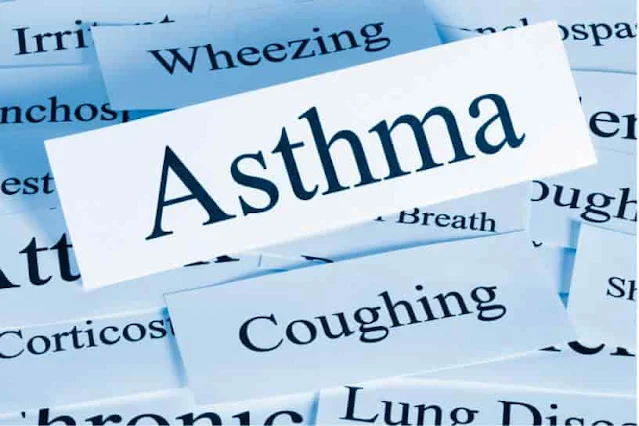Asthma is a condition of the respiratory system characterized by chronic inflammation of the airways (respiratory tract) that narrows and produces larger amounts of mucus than normal which makes breathing difficult and may cause coughing, bronchial spasms, choking sensation, and wheezing noises in the chest.
Symptoms may be mild or severe and may occur in spontaneous
episodes or over a prolonged period. Asthma usually manifests itself in events
called attacks or flare-ups that may be separated by intervals of months or
even years without symptoms.
Medications and appropriate treatment along with home
remedies for asthma can be helpful in controlling the disease. Treatment ranges
from identifying stimuli to making lifestyle changes.
Although the disease has a strong hereditary component, the
manifestations of asthma occur in response to different triggering stimuli that
can be endogenous (internal to the person) or exogenous (from the environment).
The former includes stress and strong emotions, excessive
physical exercise, especially during cold seasons; while the exogenous triggers
may be exposure to dust mites, pet hair or feathers, pollen, cigarette smoke,
or burning wood, among others.
The body also produces more mucus, which restricts the
passage of air through the bronchial tubes and makes it even more difficult to
breathe properly.
The body also produces more mucus, which restricts the
passage of air through the bronchial tubes and makes it even more difficult to
breathe properly.
- coughing that does not go away
- wheezing when exhaling
- shortness of breath
- very fast breathing
- pale, sweaty face
Quick treatment of symptoms can help prevent an asthma
attack from getting worse. If symptoms do not improve, seek emergency medical
help.
In many cases, being overweight can make severe asthma
worse. It is important to maintain a healthy, balanced diet, which includes
plenty of fruits and vegetables. These are good sources of antioxidants such as
beta carotene and vitamins C and E can help reduce airway inflammation.
If you experience a relapse in asthma symptoms after eating
certain foods, try to avoid them. You may have allergies to foods that cause
your symptoms to worsen. Talk to your doctor to confirm this.
2. Caffeinated Tea or Coffee
The caffeine in black or green tea and coffee is believed to
help treat asthma. It works similarly to theophylline, a popular asthma
medication, which opens the airways.
The research found that caffeine can slightly improve
breathing function in people with asthma for up to 4 hours. Still, there is not
enough evidence to show whether caffeine can improve asthma symptoms.
BBT involves breathing out through your nose instead of your
mouth. Exhaling through your mouth can dry out your airways and make them more
sensitive.
Some people may experience fewer respiratory infections when
using this technique. Other people who practice BBT find that it helps raise
their carbon dioxide levels. However, there is no conclusive evidence to
support this theory.
4. Yoga
Research indicates that yoga may be an effective home remedy
for asthma. The data showed that participants with asthma who practiced
physical yoga postures called Asanas, yoga breathing practices called Pranayama
and meditation had:
- lower frequency of asthma attacks
- fewer asthma symptoms
- improved lung capacity
- better blood flow
- better response to medications
Omega-3 oils, which can be found in fish and flaxseed, have
been shown to have many health benefits. They can also decrease airway
inflammation and improve lung function in people with severe asthma.
However, high doses of oral steroids can block the
beneficial effects of omega-3 oils. It's a good idea to talk to your doctor
before increasing your omega-3 intake.
6. Ginger
Ginger is one of the best natural products to treat
respiratory problems such as bronchitis or cough and is that among its benefits
is its anti-inflammatory properties. That is why ginger tea is a great
alternative to cure asthma naturally.
Preferably buy a piece of ginger, chop it, and add it to
boiling water. Leave it in the boiling water for at least 5 minutes to release
its flavor, and a little more resting for it to concentrate. Drink a cup of this
tea daily to help treat asthma symptoms and improve your asthma.
7. Essential Oils
Essential oils are also a great alternative to cure asthma
with home remedies. These oils are concentrations of the aromatic and medicinal
compounds of different plants, extracted from flowers, leaves, and roots, so we
can take advantage of their properties in different ways.
Like homeopathic asthma treatment, aromatherapy is not
backed by any scientific evidence that supports its operation, but this does
not mean that essential oils can not be very useful.
If we use them through the skin, rubbing them on the chest
while performing a gentle massage, we can alleviate some of the symptoms of
this disease.
8. Reduce Stress
Experts say that stress and powerful emotions, such as
anger, can sometimes trigger asthma attacks. Techniques to help people reduce
their stress levels may be useful home remedies for asthma, although further
research is needed to confirm this.
Techniques that people may find beneficial include:
- Breathing exercises
- Massage therapy
- Mindfulness
- Meditation
- Hypnotherapy
Asthma is a serious disease that affects millions of people.
Although there is no cure, people can manage it with consistent medical care.
Self-care is an important part of asthma management, and many different home
remedies for asthma help support individual wellness.
Avoiding known triggers, practicing yoga or other forms of
regular exercise, using herbs and supplements correctly, and harnessing the
power of technology to track all these initiatives can help.
The symptoms and severity of asthma are always changing.
Following your plan will help you avoid asthma attacks and minimize the
disruption caused by asthma symptoms.
Meet with your doctor regularly to review your treatment.
Take your asthma diary and action plan with you so you can review them with
your doctor and make any necessary changes to your treatment plan.

0 comments:
Post a Comment